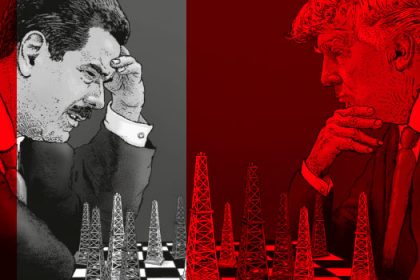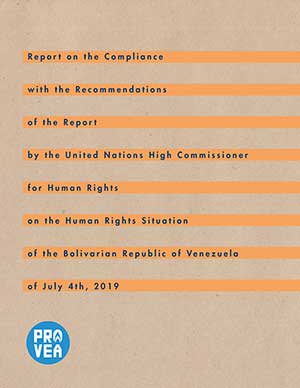Provea – Peace Laboratory
Executive Summary
A pattern of persecution and harassment against people from different areas of civil society critical to the regime was noted during the first two months of the state of alarm in Venezuela due to the COVID-19 pandemic, from March 13 to May 13. During the first month, the so-called Bolivarian Fury, following calls made by Nicolás Maduro himself, went on a wave of harassment against the homes of social leaders and members of the political opposition, as well as people critical of the regime. Tagging family homes with threatening messages by the Bolivarian Fury spread throughout the country. 58 homes in 19 states were vandalized and tagged enemies of the national government, risking the integrity and life not only of its inhabitants but all the people who hold a critical opinion of the National Executive. 51 of the attacked houses belong to members of political parties, 2 to human rights defenders, 4 to journalists, and 1 to El Tigre former mayor’s brother.
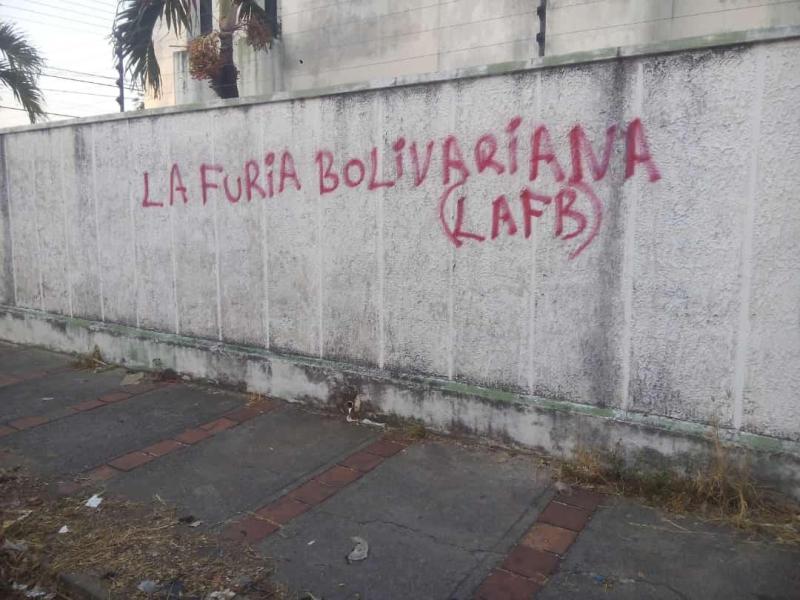
In these two months, at least 85 arbitrary arrests not complying with the principles of due process, the presumption of innocence, and the right to defense were registered. 22 journalists and members of the media were arrested; 11 arrests were made against public officials from the opposition or people linked to them; 12 arrests of medical doctors or health personnel were recorded; 3 more arrests were made against workers of the state-run companies, 4 against human rights defenders, and 3 against teachers. A serious pattern detected was the arbitrary arrests of relatives of people who are being sought or requested by the security organs as a form of pressure to reveal their whereabouts or to turn them in. 8 additional arrests were monitored against people of diverse profiles. In the case of the arrests at the Valhis Baseball Academy, 5 arrests were made.
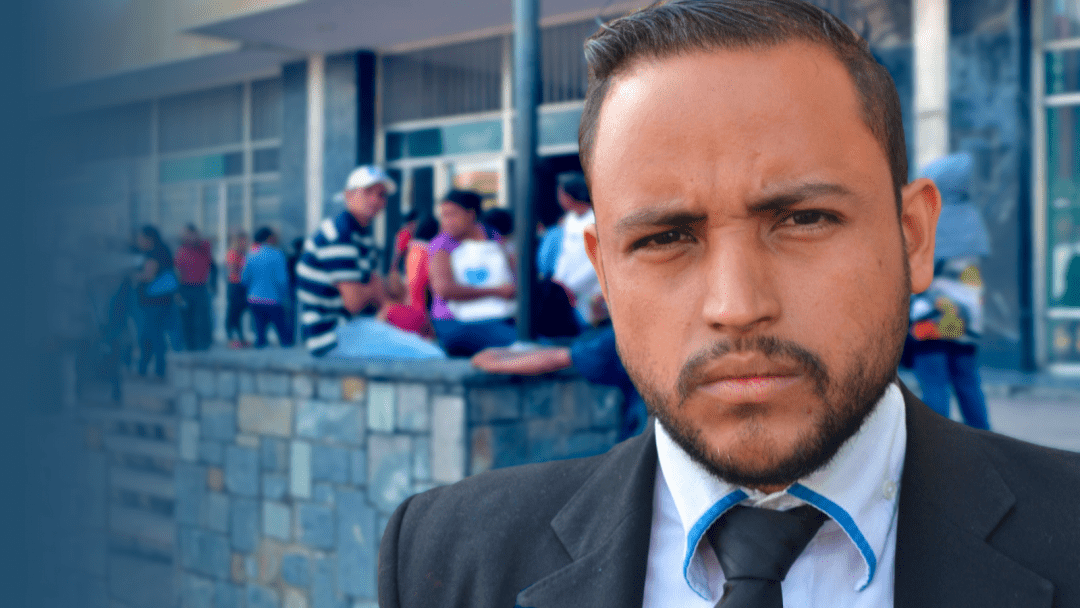
It was possible to compile a record, with names and surnames, of 51 people who were arbitrarily detained in the context of protests. Demonstrations as a mechanism of denouncing and demanding the state to address the problems of power cuts, access to water, gas, and food. These figures are undercounted since some mass arrests have gone without being recorded, or without people making the corresponding complaint.
«Read also | Informe: Patrones de violación de derechos civiles durante 2 meses Estado de Alarma en Venezuela»
Finally, the unfortunate balance of 2 people killed in the context of protests was reported. The first case took place in Upata, Bolívar, and the second in Mérida. Both men were peacefully protesting for food and public services. In both cases, the perpetrators remain unknown, and no result of an investigation by the Public Ministry has been presented.

The new extension of the state of alarm and the state of exception, the militarized response to the pandemic, the increasing failure of basic services such as water -vital to face the Covid-19-, the lack of universal social food programs, the impossibility of normalizing the working hours to allow the neediest and the hand-to-mouth workers to perceive an income, as well as the closure of food houses and schools that provide food to some of the most vulnerable population, lead us to raise the alarm and concerns about the deteriorating conditions of our economic, social, and cultural rights and their consequences. The response to these valid demands, which call for immediate attention from the State, cannot continue to be indiscriminate repression, arbitrary arrests, or the murder of people in vulnerable circumstances.
We demand the halt of repression, persecution, and harassment as a response to criticism and a transparent, differentiated, participatory, and universal approach to the crisis that allows for a reduction of human rights violations in times where concerted action, the promotion, and safeguard of rights is the appropriate way to face the pandemic affecting the country and the planet.
Detailed data of the cases monitored during the first 2 months of the state of alarm due to the Covid-19 outbreak are presented below.
Regulatory context: State of alarm and exception; economic emergency.
Article 338 of the Constitution of the Bolivarian Republic of Venezuela (CRBV) establishes that a “State of Alarm may be decreed when catastrophes, public calamities, or other similar events occur that seriously endanger the security of the Nation or its citizens. Said state of exception will last up to thirty days, being extendable for up to thirty more days ”. On March 13, 2020, in the context of the Covid-19 Pandemic, Nicolás Maduro issued decree 463/2020, published in Official Gazette No. 6,528, establishing the state of alarm.

It is worth remembering that, since January 15, 2016, a decree of State of Exception and Economic Emergency is in force in Venezuela. It has been extended unconstitutionally for more than 4 years, allowing Nicolás Maduro to ignore the National Assembly and to govern in a discretionary and uncontrolled manner since then.
The decree of state of alarm was renewed on April 12 and although the CRBV provides that it can be extended only once, it was extended again on May 12 and published on the Official Gazette No. 6,534 along with the extension of the decree of economic emergency effective nationwide. The measure came into effect on May 4 and will last for another 60 days.
Venezuela is currently under both a state of exception and economic emergency and a state of alarm. During this timeframe, March 13 to May 13, 2020, Provea and the Peace Laboratory have monitored government acts that may violate the rights to personal freedom, freedom of information and expression, life, and protest. We also monitor the criminalization, threats, and harassment against people who criticize the government policies in this period.
1. Bolivarian Fury. Attacks on houses.
From the Miraflores Palace on March 26, 2020, Nicolás Maduro spoke of the Bolivarian Fury as a response from the “civic-military and police union” to the decision of the United States judiciary to offer a reward for information that facilitate the arrest of high officials of the National Executive. He expressed: “the civic-military police union, the indestructible civic-military police union. (…) If one day the Colombian imperialism and oligarchy dared to touch us, prepare for the Bolivarian Fury, the Bolivarian Fury of a people that would devastate all of you. First time I say it, maybe first and last, but let them know it ”
On March 28, 2020, in a statement for La Hojilla, broadcast by the Venezuelan State Television channel (VTV), Nicolás Maduro said: “The Bolivarian Fury is stronger than ever. If it used to be a more or less secret plan, the Bolivarian Fury is now a plan for everyone. The plan of the Bolivarian Fury. (…) Now Diosdado is going to show some little examples of how far we can go. “I ask the Communal Councils, the CLAPs, the UBCs, the Popular Units of Integral Defense, to help us identify any suspicious place where you believe there may be a group of mercenaries and paramilitaries who entered Venezuela in the darkest night of March. I ask for the support of the Bolivarian Fury ”.
On March 28, 2020, Diosdado Cabello, president of the National Constituent Assembly, used the Twitter hashtag #FuriaBolivariana during his weekly TV show “Con el mazo dando” and became a trend. During the broadcast he said: “Beware of thinking you time has come; Be careful, it would be very serious to try to divide the revolutionary movement, you could be surprised … Well, not surprised, because this is not a surprise, you will learn a lesson about what the people can do. (…) We have mentioned it here, and that is the reason for today’s hashtag #FuriaBolivarianaEnAlerta (Bolivarian Fury on Alert). (…) But being this way, you got them into big trouble, you gentlemen in the opposition because the people will become the Bolivarian Fury. It will become the Bolivarian Fury. They got them in big trouble. ”
The next day, on March 29, 2020, 48 homes of 48 different people identified as opponents and enemies of the government woke up to graffiti threats accompanied by the phrase “Bolivarian Fury”. In the following two days, 4 additional cases were registered for 52 attacks in total in 19 states of the country and the Capital District.
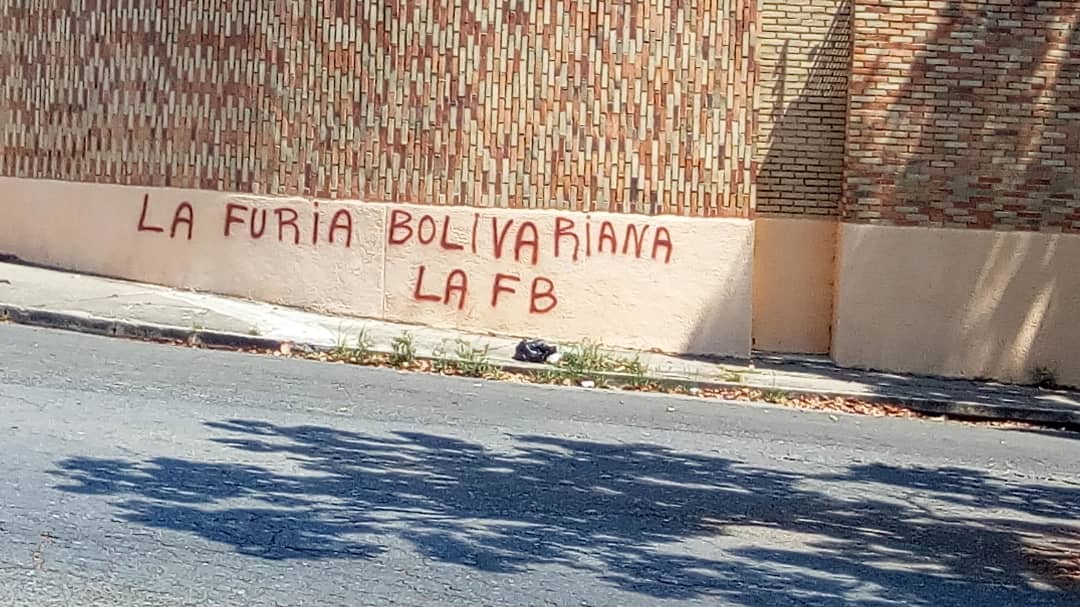
In the first 2 months of the state of alarm and quarantine due to the COVID-19 outbreak, from March 13 to May 13, 58 attacks associated with the Bolivarian Fury were registered against homes marked with threatening messages for being critical of the Nicolás Maduro government. 54 cases took place during the first month of quarantine, with 48 attacks taking place in just one day, March 29. 2 attacks were carried out on March 30, and 2 others on March 31. 4 cases were registered in April. The attacks were registered in 19 states and the Capital District, except for 5 states: Apure, Aragua, Mérida Sucre, and Zulia. 51 of the houses attacked belong to activists from political parties, 2 to human rights defenders, 4 to journalists, and 1 to the brother of a former mayor of El Tigre.
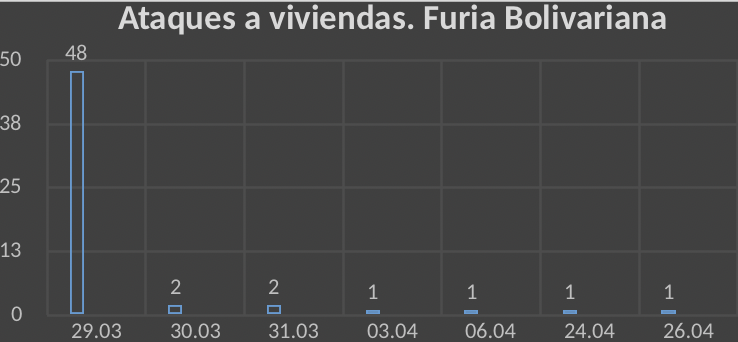
1.1 Attacks against the residences of members of the National Assembly.
16 attacks against 16 deputies and their homes in 9 states of the country were recorded during acts of intimidation against people identified as enemies and critics of the regime. 5 of the affected belong to the Acción Democrática (Democratic Action, AD) party; 1 to Un Nuevo Tiempo (A New Time, UNT); 5 to Primero Justicia (Justice First, PJ); 3 to Voluntad Popular (Popular Will, VP); 1 to Camina (Walk); and 1 is an Independent activist. (Table 1)

1.2 Attacks against the residences of members of political parties and regional leaders.
A total of 18 attacks against 18 regional leaders representing political parties from 11 states in the country were recorded. 3 from Vente Venezuela (Come Venezuela); 2 from Causa R (The “R” Cause); 1 from Primero Justicia; 6 from Un Nuevo Tiempo; 1 from Alianza Bravo Pueblo (Alliance of the Brave People); and 5 from Voluntad Popular.
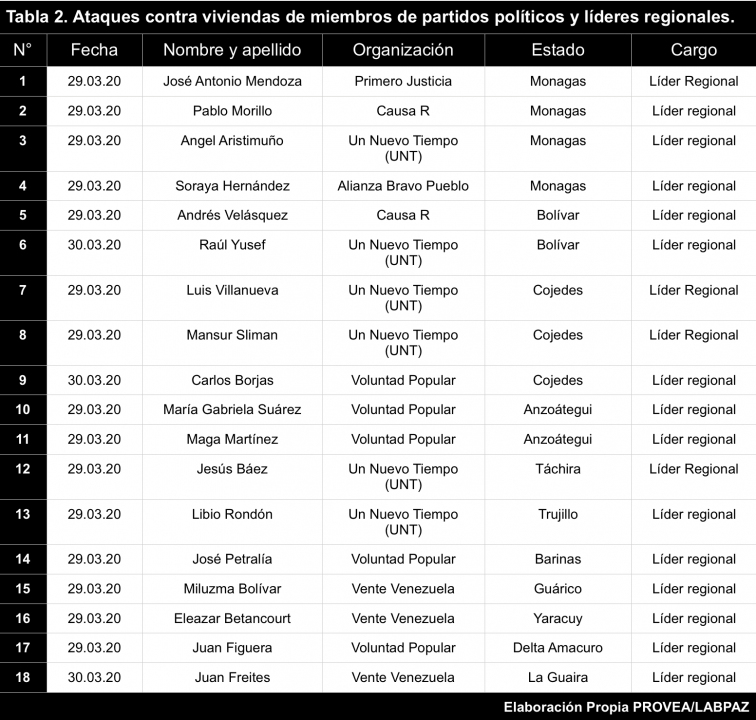
1.3 Attacks against current and former governors and mayors
The attacks on houses were also carried out against the current governor of Nueva Esparta, Alfredo Díaz, from the opposition Democratic Action party, as well as against 2 former governors, Liborio Guarulla in Amazonas and Orlando Fernández Medina in Lara. 2 attacks were made against former mayors Miguel Chacón in Ayacucho, Táchira, and Alfredo Ramos in Iribarren, Lara.

Table 3. Attacks against current and former governors and mayors.1.4 Attacks against the residences of local leaders
The homes of some local political leaders were also marked with graffiti, in 11 cases involving 11 different victims, in 6 states of the country. 7 of them belong to the Primero Justicia party; 2 to Voluntad Popular; and 2 to Alianza Bravo Pueblo Bravo.

1.5 Attacks against the residences of journalists.
The homes of some local political leaders were also marked with graffiti, in 11 cases involving 11 different victims, in 6 states of the country. 7 of them belong to the Primero Justicia party; 2 to Voluntad Popular; and 2 to Alianza Bravo Pueblo Bravo.

1.6 Ataque contra Defensore/as de Derechos Humanos
Among the people who saw their houses vandalized are 2 Human Rights activists from Táchira. They are Javier Tarazona, President of Fundaredes, and Adriana Carrillo, representative of the Coalition against Corruption in the state.

2. Detentions during the first 2 months of the State of Alarm and Quarantine.
During the first month of quarantine, from March 13 to April 13, at least 36 arrests were recorded. In the second month, from April 13 to May 13, there were at least 49 arrests. For a total of at least 85 arrests in the context of the COVID-19 outbreak and the State of Alarm.
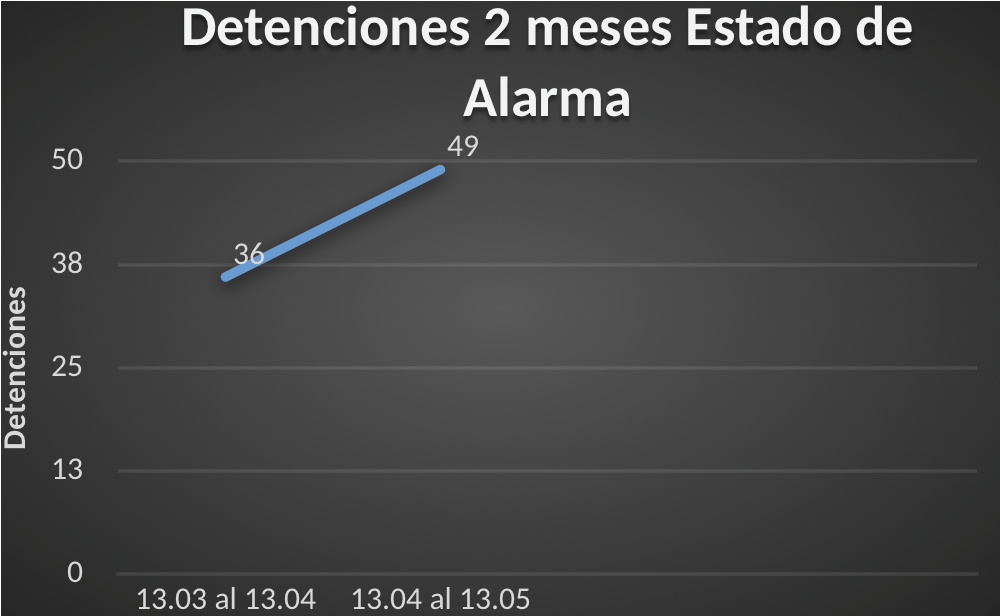
2.1 Detenciones contra Comunicadores y periodistas
From March 13 to May 13, at least 22 arrests against journalists and people linked to the media were recorded in 10 states of the country: Táchira (4); La Guaira (1); Miranda (5); Caracas (4); Cojedes (1); Guárico (1); Mérida (1), Delta Amacuro (3), Apure (1) and Zulia (1). (Table 8)

Here are some emblematic cases of arrests that exemplify some of the arbitrary, discretionary actions, as well as the violation of the right to information and freedom of expression.
Darvinson Rojas. Arrested for tweeting information about the Covid-19 outbreak.
The arrest of journalist Darvinson Rojas, in Caracas, on March 21, 2020, by the Special Action Forces (FAES). Darvinson Rojas reported through his Twitter account that officers from the FAES were outside his home requesting to take him to their command. The officers refused to show a search warrant. Rojas reported the officers saying “I do not need a search warrant (…) My boss is going to come and he is not going to come for good,”. They claimed to be there because of the tweet he had posted. 30 minutes later, the officers entered his home by force and detained the journalist and his parents, Miriam Sánchez and Jesús Rojas, (they were released later that night). The FAES Illegally raided his home and took away computers and cell phones. On March 23, 2020, he was presented before Court and accused of instigating hatred and public instigation through his tweets. He was denied the possibility of private attorneys, forcing him to the Public Defense. A precautionary measure was given for bail, in which 4 guarantors were required. He was released from prison and is still on trial as of April 2, 2020.
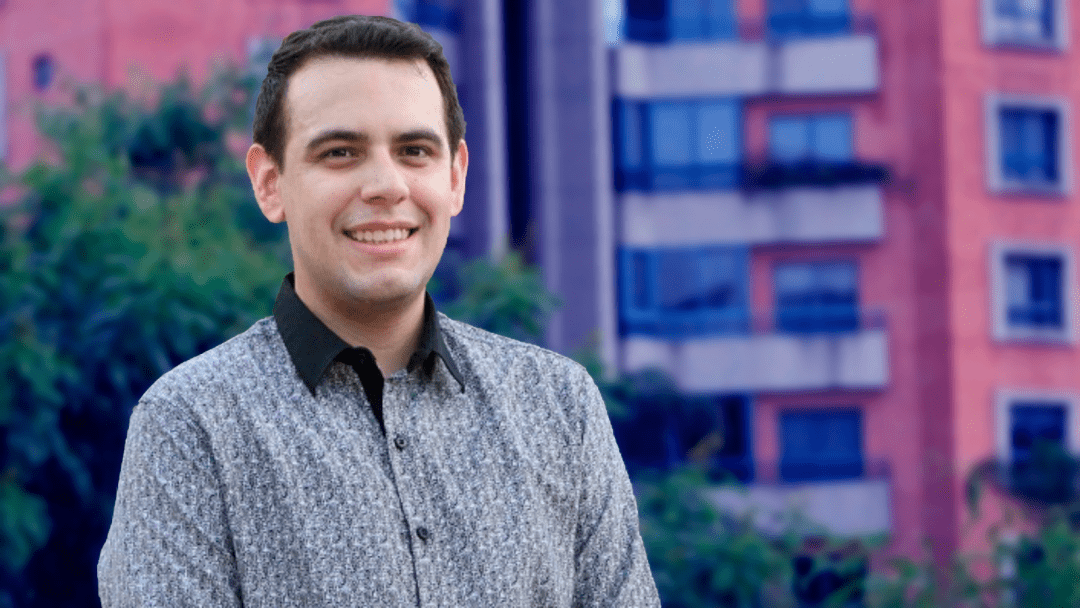
Jesús Torres and Jesús Manuel Castillo. Arrested for sharing a video on social media.
Jesús Torres and Jesús Manuel Castillo are students of mass communication at the Bicentennial University of Aragua (UBA) and work at Radio Cima 96.7FM station. They were detained by the FAES on March 12, 2020, at the radio station’s headquarters after publishing a video about alleged cases of Covid-19 in the Victorino Santaella Hospital in Los Teques, Miranda. They remained at the headquarters of the Bolivarian National Police (PNB) until Sunday March 15, 2020, having to appear before judicial authorities every 8 days.
Arnaldo Sumoza. Arrested for covering a protest.
On April 16, 2020, Arnaldo Sumoza, director of Guarico’s TV Channel 15 and broadcaster at 1300AM station, part of the FM Center circuit, was released through a substitute measure after being brought into court No. 14 of the judicial circuit of San Juan de Los Morros in Guárico because the local court in his hometown El Sombrero did not have the service of running water. He was held for 3 days after covering a public protest and was accused of instigating hatred and he was directed to present before the authorities every 60 days, in addition to continuing the judicial process once the quarantine ends.
Eduardo Galindo Peña. Arrested for publishing an article on a website.
Eduardo Galindo Peña, a journalist, director of the Senderos de Apure news site, and secretary of the National College of Journalists (CNP) in Apure was arrested on May 15, 2020, after officers of the Anti Extortion and Kidnapping National Command (CONAS) and Bolivarian National Guard (GNB) contacted him with a court order to declare about an article he published on the website “Senderos de Apure”. According to Galindo, the commission of 3 officers and 3 men dressed in civilian clothes asked him to hand over his phone, which he refused. Then the officers went to his home to take the journalist’s laptop. His wife, Yoleide Rodríguez, refused and they detained her along with her nephew Leonardo Galindo. Three computers were taken from the place, together with the phones of the detainees. His relatives were released with precautionary measures after the presentation hearing in the Third Control Court of San Fernando de Apure. Galindo was granted a substitute measure, but he required 5 guarantors. He was released on Mayo 5, 2020, and must appear in court every 8 days.
2.2 Detentions of public officials, personnel linked to political leaders.
During the first 2 months of the State of Alarm, at least 11 members of the National Assembly, political leaders, and people related to them were deprived of liberty. 2 substitute Deputies of the National Assembly were arrested, Renzo Prieto and Tony Geara, as well as 4 people linked to the President of the National Assembly, Juan Guaidó, 1 active councilor, 2 former councilors, 1 former mayor, and the director of Civil Protection of Nueva Esparta. (Table 9)
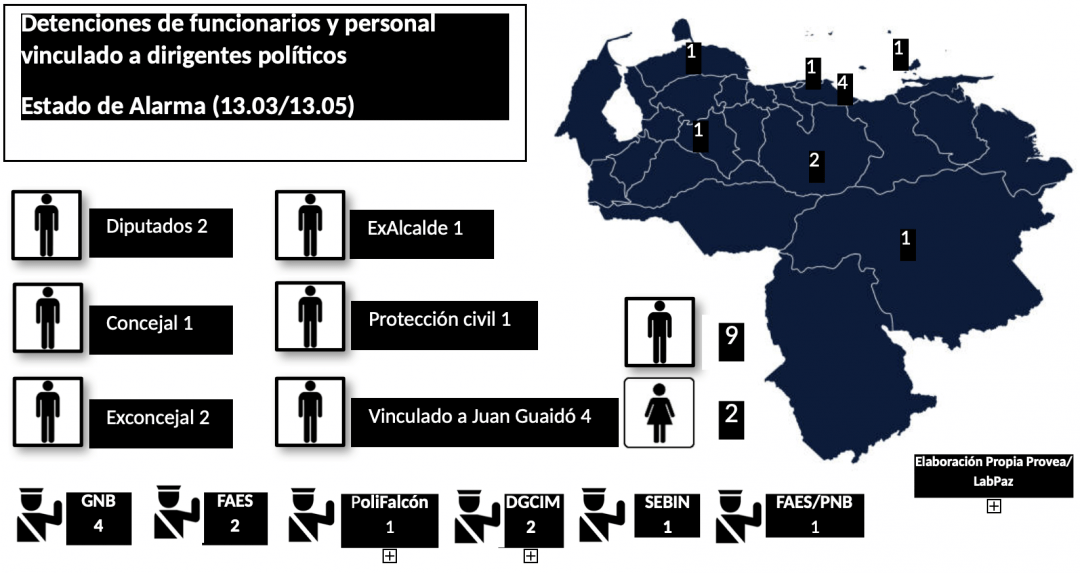
Entre los detenidos, todos por motivaciones políticas, destacan algunos incidentes que muestran un patrón de actuación que viola el debido proceso y el derecho a la Justicia
Among the detainees, all for political reasons, some incidents stand out and show a pattern of violation of due process and the right to Justice.
Demóstenes Quijada and Maury Carrero. Arrested for being advisers to Juan Guaido.
On April 02, 2020, officers from the Directorate General of Military Counterintelligence (DGCIM) entered the residence of Demóstenes Quintana, advisor to the president of the National Assembly Juan Guaidó, claiming to be there to investigate a coronavirus infection and abducted him illegally. The 18th Control Court deprived the engineer of his liberty for terrorist offenses, arms and explosives trafficking, association to commit a crime, and pre-qualified him for the crime of concealing drugs in small amounts. He remains detained at the DGCIM headquarters. Maury Carrero, 40 years old, an adviser to Juan Guaido, was kidnapped by DGCIM agents, after some 15 officers arrived in her home at 4 am, took her without a warrant, and after several days presented her before the same 18th Control Court for similar charges.
Councillor Heddye Cristancho. Arrested for filming GNB officers selling fuel.
On April 22, 2020, Councillor Heddye Cristancho was detained by GNB officers for filming them while selling gasoline to people queuing at a service station, in south Guanare, Portuguesa. He was released on April 23, 2020.
2.3 Detentions of health workers.
Health workers have been harshly criminalized and persecuted during this period of quarantine and alarm. Surveillance, harassment, and punishment for those who issue public statements related to the pandemic have been repeatedly denounced. We collected at least 12 cases of health workers who suffered arrests while doing or commenting on their work. 7 medical doctors, 2 nurses, 1 Bioanalyst, 2 others health workers were arrested in 9 states of the country: Monagas (1), Táchira (1), Miranda (3), Trujillo (1), Bolívar (1), Lara (1), Nueva Esparta (1), Aragua (1), and Falcón (2).

During the early days of the monitoring period, harassment and other tactics were used as exemplary punishment to inhibit the disclosure of information by medical personnel. A message from the government against medical doctors, nurses, and other health personnel aimed to maintain full control of the information related to the pandemic.
Luis Araya. Arrested for criticizing the national government on WhatsApp.
On April 15, 2020, gynecologist Luis Araya, a practitioner at the Pastor Oropeza Riera Hospital in Carora, Lara, was arbitrarily detained by the DGCIM in his private office for criticizing a member of Nicolás Maduro’s cabinet in a WhatsApp status. He was held for 24 hours at the headquarters of the Operational Zone of Comprehensive Defense (Zodi) of Barquisimeto.
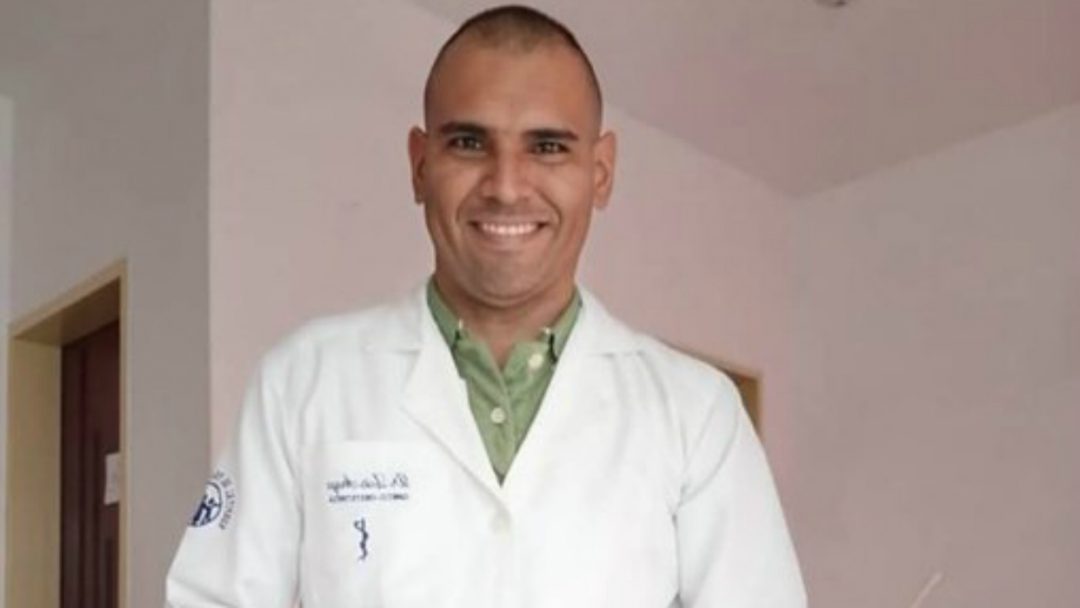
Jorge Yéspica. Arbitrarily detained for lowering his mask to drink a soda.
Doctor Jorge Yéspica declared: “I went to see a patient who was in poor condition, which is my duty as a doctor. However, it strikes me that I was detained for pulling down my face mask. I took it down to have a drink”. At the same time, he talked about the work of health professionals in Venezuela. “Medical doctors are giving our lives for the country and we cannot continue to be treated in this way. We are exposing our lives. I will continue in this fight”. He was arrested on April 19, 2020, in Villa de Cura, Aragua. He spent 30 hours in detention and was released without charges on April 21, 2020.
Andrea Sayago. House arrest for misuse of privileged information.
Andrea Sayago is a bioanalyst at Dr. Pedro Emilio Carrillo Hospital. She was arbitrarily detained on April 4, 2020, in Valera, Trujillo, by members of the Trujillo state police after warning a group of colleagues via WhatsApp about the detection of positive cases of COVID-19 in the region. She was charged with “Misuse of Privileged Information by a Public Official” and was ordered to be under house arrest following Article 242, of the Organic Code of Criminal Procedures (COPP). She remains under house arrest as of April 6, 2020.
2.4 Arrests of state-run company workers
The public companies sector was also subject to surveillance and harassment by the national government. At least 3 public company workers were arrested during the period for criticizing the national government through different means. One worker from Petróleos de Venezuela (PDV) was arrested in Anzoátegui, and 2 other workers were arrested in Bolívar, belonging to Siderúrgica del Orinoco (SIDOR) and Corporación Venezolana de Guayana Ferrominera (Table 11)

The arrest of Elio Mendoza of SIDOR for forwarding a WhatsApp message.
Elio Mendoza, a supervisor at Siderúgica del Orinoco (SIDOR), was detained by DGCIM officers on April 1, 2020, after forwarding a WhatsApp message. The plant’s manager Francis Villega called Mendoza to work that night, although it was not his shift and told him that a van would be picking him up instead of the company bus. He left home and his relatives lost all contact, until the next day April 2, 2020, at 1 pm when he was allowed to call his wife. He was detained at the headquarters of the DGCIM in Puerto Ordaz. He was sentenced to custody and charged with instigation to hatred and defamation against the president of the Supreme Tribunal of Justice (TSJ). He was sent to a prison in San Félix.
Tania Rodríguez, former CVG employee. Arrested for criticizing the national government.
Tania Rodríguez, a former CVG Ferrominera employee, was arbitrarily detained on April 4, 2020, by CONAS and GNB officers and taken to the CONAS headquarters in Puerto Ordaz. Tania Rodríguez purportedly criticized the policies of Nicolás Maduro several months ago and participated in demonstrations called by Juan Guaidó. In 2019, she was harassed at her job and fired for reporting irregularities inside the iron factory. She was presented before the courts on April 5, 2020, and given the injunction to present before the authorities every 45 days.
2.5 Human Rights Defenders.
The state of alarm has also meant an obstacle to the work of Human Rights activists and the assistance of victims of Human Rights Violations, not only because of mobility restrictions but also the denial of transit permits to keep following petitions, complaints and even allow humanitarian actors continue their work of supporting vulnerable populations. During the monitoring, at least 4 human rights defenders were victims of arbitrary arrests while doing their job, in the context of the COVID- 19 outbreak and the state of alarm. (Table 12)
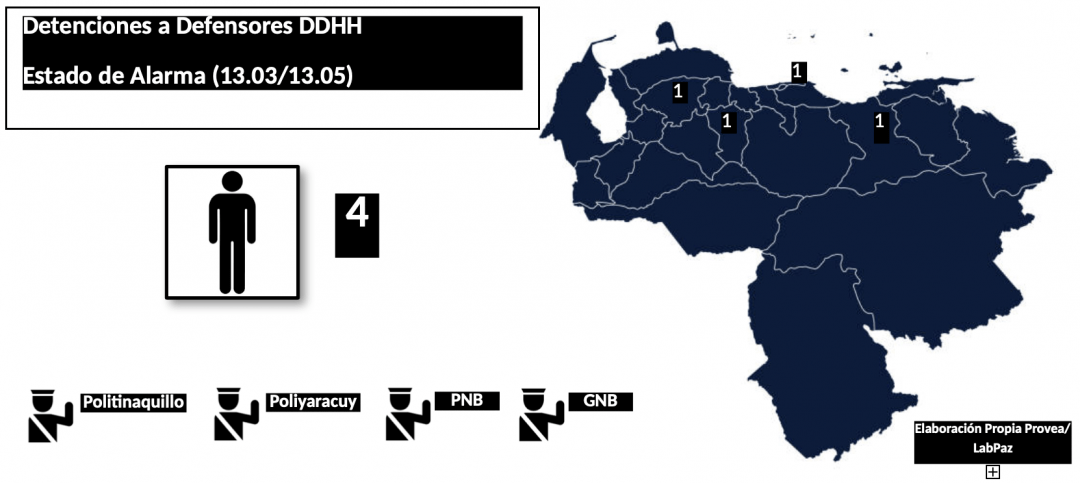
Henderson Maldonado. Arrested for joining kidney patients in protest
Henderson Maldonado, from the organization Movimiento Vinotinto, was arrested on March 31, 2020, in Barquisimeto, Lara, after joining kidney and cancer patients demanding access to fuel to get to their treatment centers. The lawyer and activist was trying to film some testimonial videos when he was approached by GNB officers who arrested him and took him to the 121st GNB detachment. There he was beaten, and psychologically and physically tortured. His phone was destroyed. He was presented in court and granted a substitute measure, having to appear before the authorities every 30 days.

Gabriel Aranguren. Detained for possessing donations of medical supplies.
On April 23, 2020, Gabriel Aranguren went to his workplace at the Action and Defense Center for Human Rights (CADEF) headquarters with a colleague to plan the delivery of personal protective equipment for COVID-19 to vulnerable communities in the area. Subsequently, he visited the home of a CADEF volunteer who makes the protective masks that the organization distributes in Tinaquillo, and finally decided to return home. Around 4.30 p.m. he was detained by Tinaquillo police officers at the vicinity of his home, who saw approximately 80 masks under his possession. Around 5.30 p.m. Aranguren was transferred to the police station. There, they informed him that he would remain at the station for as long as the officers wanted. “These things happen to you for conspiring against the revolution.” He was released some 4 hours later.
2.6 Arrests of Military Personnel
At least 8 arrests were registered among the military sector, not counting the detentions linked to the so-called armed incursion “Operation Gedeon”. All the detainees are male soldiers, 6 were arrested by members of the DGCIM. 7 detentions took place in Miranda and 1 in Caracas. (Table 13)

2.7 Detentions of teachers
3 teachers were arrested in the states of Apure, Miranda, and Nueva Esparta. (Table 14)

2.8 Detentions in the Roberto Vahlis Baseball Academy in Nueva Esparta.
On May 5, 2020, Vice President Delcy Rodríguez reported a local coronavirus outbreak in Nueva Esparta at the Valhis Baseball Academy. 49 people were infected after failing to quarantine. To that date, 367 cases were confirmed nationwide, of which 117 were located in Nueva Esparta. Failure to comply with the quarantine prompted the prosecution to issue an arrest warrant against its managers and staff. (Table 15)
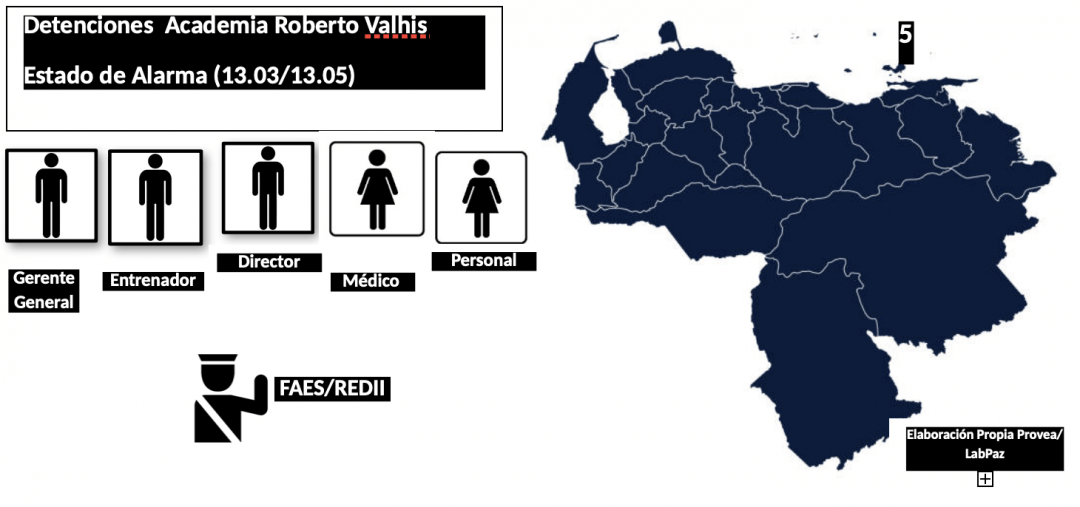
Roberto Vahlis Baseball Academy.
On April 17, 2020, 5 representatives of the Roberto Vahlis Baseball Academy were arrested and accused: Roberto Alejandro Valhis, general manager; José Luis Rodríguez, coach; María Esparragoza, physician; Robertho Vhalis, Director, and Carmen Hernández.
Tarek William Saab reported that the arrest was carried out by officers of the Insular Comprehensive Defense Region and the FAES, for “commission of serious injuries by omission in a degree of continuity and refusal to provide information on the state of the victims’ health to the General Staff of Health”. He stated that “according to the investigation, on March 13, Roberto Alejandro Valhis entered the country from the Dominican Republic vía Maiquetía without going to any health center to perform the COVID-19 screening test. (…) Then, on March 14, 5 adolescents who belong to the same academy also entered from the Dominican Republic and did not undergo any screening tests either. (…) Two people in that group were infected. They were found on April 15 at the academy, living with 57 other people and violating the social quarantine and the state of alarm decreed by the President of the Republic. Consequently, 18 other people got infected due to this irresponsibility, for a total of 20 infections in the academy.”

2.9 Detention of relatives and persons related to wanted individuals.
One of the situations that have been constant for several years and have repeated 9 times during the first two months of the state of Alarm is the arrest of family members or people linked to a person wanted by state security agencies. These detentions are made arbitrarily and the victims disappear for hours or days in some cases, becoming the subject of extreme verbal violence, intimidation, and threats to provide information on the whereabouts of the requested person.
7 of the detainees were women: 2 are married to wanted persons, 1 is the partner of a wanted person, 2 are sisters, 1 is a friend, and 1 the landlord. Of the 2 men arrested under this category, 1 is a brother, and 1 is a cousin of a wanted person. Three of the detainees are linked to Lt. Richard Alemán Castellanos; 2 to journalist Eduardo Galindo; 3 to retired GNB Colonel Oscar Pérez Romero; and 1 is Andrea Bianchi, partner of Rafael Rico, advisor to Juan Guaido. (Table 16).


Alemán Castellano Family. 4 members of the same family arbitrarily detained.
On Monday April 20, 2020, the DGCIM conducted a raid on the residence of retired lieutenant Richard Alemán Castellanos. The officers did not find him but arrested his two sisters, Yolimar and Andreína Alemán Castellanos, his cousin Manuel Castellanos, and his brother-in-law Ericsson Chaya Barrueta. Alemán Castellanos was arrested on April 20 for an alleged attack on the GNB Detachment 441 weapons park in Los Teques (Miranda). The brother of the retired GNB lieutenant denounced on April 24, 2020, that the officers held his family in isolation after accusing them of terrorism and arbitrarily detaining them. “The DGCIM broke into my house at 3:30 am and kidnapped my family, claiming that we are terrorists. During the raid on the family’s house in Puerto Cabello (Carabobo), the officers took away computers, phones, and documents”

Andrea Bianchi. Arrested for being the partner of Juan Guaidó’s assistant
On March 30, 2020, Andrea Bianchi was kidnapped by alleged FAES officers when she agreed to meet them after receiving threats to her family. She was forced at gunpoint in broad daylight to enter a vehicle in Chacaíto, Caracas She was stripped, beaten, and threatened with rape. She was abandoned 2 hours later on the street where a motorist helped her and took her home. Andrea Bianchi is the partner of Juan Guaido’s assistant.
3. Detained for protesting
A wave of protests has taken place across the country due to the exponential deterioration of access to food, fuel deficits, the worsening living conditions, and the collapse of public services that has led to blackouts extending 6 to 14 hours each day and poor access to water.
The response has been repression conducted by the national, regional, and local security forces, with the unfortunate outcome of wounded and detained people. In the 2 months of the state of alarm and quarantine, we have registered at least 51 confirmed arrests with names and surnames in the context of social protests in the country. However, we recognize that there is an undercount due to the lack of public information and the refusal of some protesters to report after they are released.
At least 41 men and 10 women have been arrested. The figures include 3 adolescents: a 17-year-old young man detained in Miranda, a 15-year-old girl arrested in Anzoátegui, and a 16-year-old boy detained in Barinas. The detentions occurred in 11 states of the country: Táchira (3), Monagas (4), Miranda (2), Sucre (1), Anzoátegui (15), Barinas (5), Aragua (6), Lara (1), Zulia (1), Carabobo (5), and Falcón (8).
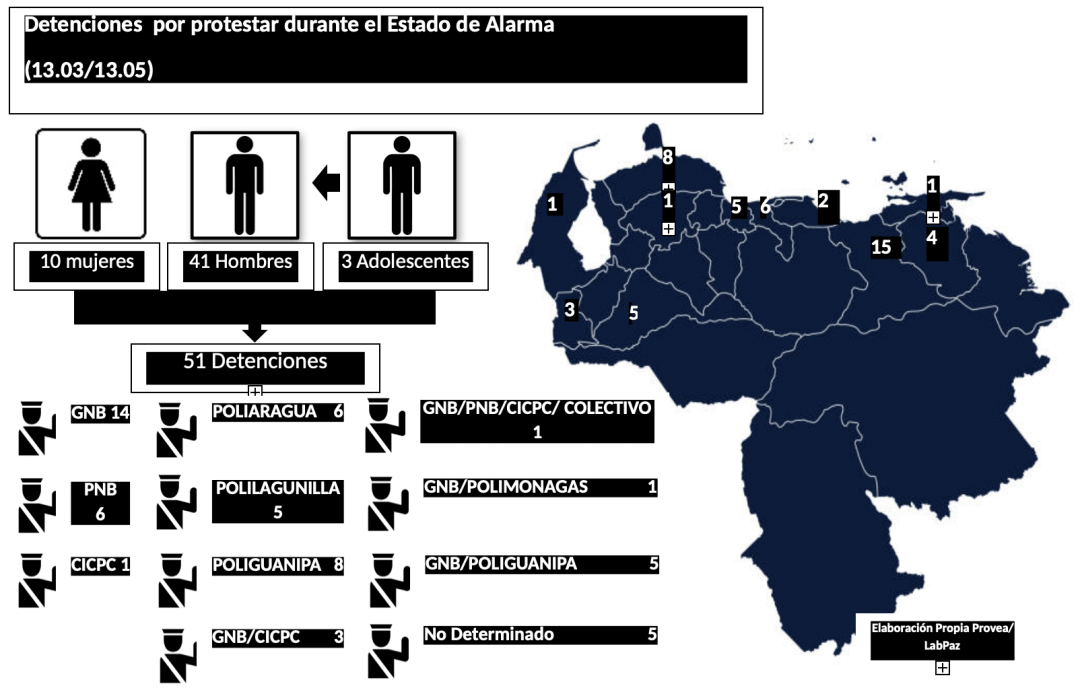
The GNB made 14 of the arrests under this category, and 10 others in joint operations with regional police or the National Police (PNB). One arrest was carried out with the participation of irregular armed groups (“colectivos”). Poliguanipa made 8 arrests, the PNB and PoliAragua 6 arrests each; Polilagunillas 1 arrest; the Bureau for Scientific, Criminal and Forensic Investigations (CICPC) 1 arrest. The organ involved in the 5 remaining arrests in this category has not been specified.
Killed in protests
Once again, the excessive use of force by security organs with the participation of irregularly armed civilians has been a constant in protests for public services and economic and social rights. This has left 2 people killed in the context of demonstrations under total impunity. Charlis Antonino Nuñez was killed on April 23, 2020, in Upata, Bolívar, when he was taking part in a protest for food. On May 4, 2020, 21-year-old Rafael Hernández was assassinated in Mérida while participating in a protest over recurring power cuts in the region.

You can download the full report in Spanish, HERE.
Provea – Laboratorio de Paz
Covid 2 meses
